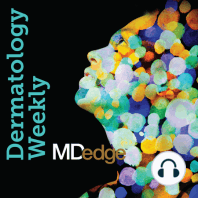21 min listen

Urban African Americans have varied dermatologist access, more vulvar melanoma for women, and Derm residents talk compounding medications
Urban African Americans have varied dermatologist access, more vulvar melanoma for women, and Derm residents talk compounding medications
ratings:
Length:
19 minutes
Released:
Jun 25, 2020
Format:
Podcast episode
Description
Compounding medications allows physicians to customize formulations for individual patients. In this resident takeover, Daniel R. Mazori, MD, talks to Nadine Shabeeb, MD, MPH, about compounding topicals in dermatology. They discuss clinical scenarios in which these treatments may be warranted as well as potential drug combinations. “What’s cool about compounding for [conditions such as acne, rosacea, and hyperpigmentation] is that there are oftentimes multiple etiologies that lead to patients developing those conditions, and with compounding you can mix multiple things together to target some of those different factors,” Dr. Shabeeb says. They also discuss potential disadvantages and regulations for compounded medications. * * * This week in Dermatology News: Pilot study shows apremilast effective for severe recurrent canker sores For urban-based African Americans, proximity to a dermatologist varies by ZIP code Vulvar melanoma is increasing in older women * * * Key takeaways from this episode: Compounding is a way of mixing or combining different medications and formulations that are not commonly available at most pharmacies. Advantages of topical compounded medications include simplifying treatment regimens, prescribing treatments for rare conditions that are not commonly available, bypassing potential insurance issues, and creating topical versions of oral medications. Safety and efficacy data for compounded medications are lacking. “This is usually because of the unique nature of what’s being compounded, because multiple different things are oftentimes combined together, so there’s no published data about how safe and also how efficacious these are compared to just one single formulation being used,” Dr. Shabeeb explains. Compounded medications are not covered by insurance, and out-of-pocket cost may be prohibitive for some patients. “That being said, it may be lower than the cost of a branded medication that’s not covered by insurance, but it may be more than a generic medication that is covered by insurance,” Dr. Shabeeb says. Compounding pharmacies follow safety standards set by the U.S. Pharmacopeia, and the U.S. Food and Drug Administration prohibits physicians from prescribing compounded medicines that are approved, adulterated, or misbranded drugs. “Compounded medications can’t mimic a branded medication. It has to be either a unique formulation, or combination, or strength,” Dr. Shabeeb explains. Compounding pharmacists can be a great resource for dermatologists in terms of combining appropriate treatments for patients. Hosts: Nick Andrews; Daniel R. Mazori, MD (State University of New York Downstate Medical Center, Brooklyn) Guests: Nadine Shabeeb, MD, MPH (University of Wisconsin Hospital and Clinics, Madison) Disclosures: Dr. Mazori reports no conflict of interest. Dr. Shabeeb reports no conflict of interest. Show notes by: Alicia Sonners, Melissa Sears * * * You can find more of our podcasts at http://www.mdedge.com/podcasts Email the show: podcasts@mdedge.com Interact with us on Twitter: @MDedgeDerm
Released:
Jun 25, 2020
Format:
Podcast episode
Titles in the series (100)
Get to know Julie Croley, MD, from Dermatology Weekly's Resident Takeovers: Julie Croley, MD, also known as on Instagram, joins MDedge producer and host of the Postcall Podcast, Nick Andrews. You can find more interviews like this on the Postcall Podcast at by Dermatology Weekly